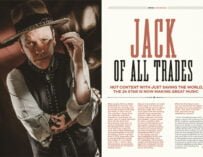
Dan Whitehouse: “The songs almost wrote themselves, pouring out like molten glass.” Photo: Pete Millson
The acclaimed Black Country singer-songwriter delves into the history, art, craft, and emotional resonance of glass in his recent works
I didn’t see it coming, but glass has emerged as a recurring theme in my songwriting in recent years. With hindsight, I can say it all began with a song co-written with John Patrick Elliott on my Dreamland Tomorrow release (2020, Reveal Records). That song, Glass, explores glass as a metaphor for mental health – fragility, transparency, the way light passes through but can also distort. The real momentum for glass as a theme gathered with two albums: The Glass Age – my commentary on how we’ve adopted the glass screens of our digital communication devices as part of the family – and Voices From The Cones, my song cycle about the history of glassmaking in Stourbridge, near my hometown of Wolverhampton in the Midlands. These projects allowed me to delve deep into the history, craft, and human stories intertwined with this remarkable material.
Discover 16 ways to start your next song
My Connection to Glass
My personal connection to glass began when I was invited – alongside storyteller, poet, and author John Edgar – to explore an extraordinary oral history archive of interviews with former glass factory workers. The resulting song cycle, Voices From The Cones, was commissioned by Alan Ellsmore at Ruskin College, built on the site of the old glassworks. These interviews were so revealing and inspiring that the songs almost wrote themselves, pouring out like molten glass.
Some 400 years ago, a group of Huguenots fleeing persecution in France travelled to Stourbridge. Drawn by the abundance of raw materials needed for glassmaking – coal, sand, clay, limestone, and iron – they laid the foundation for the Stourbridge glass industry. A mile-long stretch of glass manufacturers, known as the ‘Crystal Mile’, sprang up, making Stourbridge synonymous with high-quality glass worldwide. I first visited Stourbridge as a kid to swim at the Crystal Leisure Centre, completely unaware of the story behind the name but captivated by its mystery.
Fast-forward to today’s digital age, and those original Huguenot glass workers could never have imagined the future uses of glass – our windows into the world now reduced to the thin, cold screens of our phones and computers.
Listening to former glassworker Joan Plant’s gentle voice felt like hearing a message from a forgotten world. She spoke with such tenderness about her old boss at the glassworks, who offered her refuge inside a safe when she was scared of thunder and lightning. He even gifted her an intricate rose bowl when she took time off for her firstborn. It felt almost alien – this warmth and sense of community within what was essentially a business. A stark contrast to what I see outside my window today – Amazon drivers pushing through congested traffic in vans they’re forced to rent, and self-employed individuals burning the midnight oil to stay afloat.

Dan Whitehouse: “The demand for cut crystal isn’t what it once was, much like the demand for physical albums. But the spirit remains.” Photo: Pete Millson
As part of the process, John and I interviewed former glassworker Malcolm “the last apprentice” Andrews. He shared his pride in being introduced to the glassworks at just two years old – a tradition carried on by generations of his family. Malcolm’s stories brimmed with a deep romanticism that resonated with me. He spoke of a tightly knit community, including candid moments like his first sex education lesson at the glassworks, which found its way into the song The Old Savoy. His tales painted vivid images of a world where devotion to one’s craft was a way of life, where respect for peers and admiration of their skill was palpable.
I grew up in the Black Country, and derelict factories were always the backdrop of my journeys in and out of Wolverhampton. Hearing Joan and Malcolm’s recollections breathed life into those bricked-up windows and doors, transforming the forgotten landscapes of my childhood into vibrant scenes of community and creativity. Their words reminded me of conversations I’ve had over the years with fellow musicians, producers, and engineers – those who share the same blind devotion to their craft, who can talk for hours about the tools of the trade. It’s a far cry from the working conditions of today, where so much is reduced to gig economies and endless hustles just to make ends meet.
The powerful language used to describe their experiences served as a creative catalyst for me. They spoke of the glassworks as a beehive of activity, a place where they “never wanted to do anything else”. I related immediately – this was exactly how I felt about being a musician, and it made the songwriting flow naturally. The song cycle was finished within two weeks.
Later, meeting some of the current glassmakers, I felt a kinship with those still practising the craft today. Gillian Welch sings in her song Everything is Free that, “we’ll do it anyway” – a prophetic comment on the sea change within the record industry. Things change. People move on. The demand for cut crystal isn’t what it once was, much like the demand for physical albums. But the spirit remains.

Dan Whitehouse on his A Night Of Glass live show: “Like glass itself, the show is always shifting, always reflecting.”
The Glass Age: A New Perspective on Connection
Not long after completing Voices in 2019, my life took a dramatic turn. My then-five-year-old son moved to Japan with his mother, and suddenly, glass took on a new meaning. The screens of my phone and laptop became my lifeline – a fragile portal connecting me to him across the miles. I noticed a shift in my language; I became more explicit in expressing myself. “I love you, I am so proud of you. You are doing so well.” These were the phrases that sustained our connection through the cold, unyielding surface of glass.
A trip to visit him in January 2020 resulted in an ear injury that left me grounded in Tokyo for 18 months due to the pandemic. This period of isolation transformed me, bringing me closer to my songwriting and inspiring another album, The Glass Age – a reflection on how digital communication has become not just a tool, but an intimate part of our lives.
During the pandemic, I noticed it in others too – open-hearted video messages from parents to grown-up children, siblings connecting on weekly Zoom calls, sharing more intimate conversations than any in-person meeting might allow. The glass screen leaves no space for ambiguity; it feels urgent, raw. The sense of missing each other felt like a hunger, and the screen was our piecemeal. It wasn’t perfect, but it kept us fed.
In Japan, my son lives in Minatomirai, a dense cluster of high-rise glass and concrete near Tokyo Bay. It’s a place where the sea air brings some relief from the claustrophobia of modern life. We all spend so much time behind screens, pulled into algorithms that distract us from our need to connect with nature. In my song The Tide, I reflect on how we are physical beings who need to flow – how being confined to a digital world jarringly contrasts with our need for real air and water.
Glass as Inspiration
The Glass Age is not just a lament for lost times. It’s also a celebration of the digital age and the connections it fosters. The glass screen offers a window into a world of artists and musicians I might never meet in person, leading to rich creative collaborations. I’ve discovered countless human-interest stories online that have sparked songwriting sessions – like the ones I share with my friend Jason Tarver, where we exchange articles under the heading ‘Inspiration Corner’. These stories, discovered via glass, allow us to tell our own through song.
These songs – and my two glass-themed albums – eventually led me to create my live show A Night Of Glass, celebrating the history of this remarkable material, the communities surrounding it, and how we use it today. Both albums are studio collaborations with Swedish multi-instrumentalist Gustaf Ljunggren, and we are excited to play live together for the first time in October ‘24. Like glass itself, the show is always shifting, always reflecting.


































Related Articles